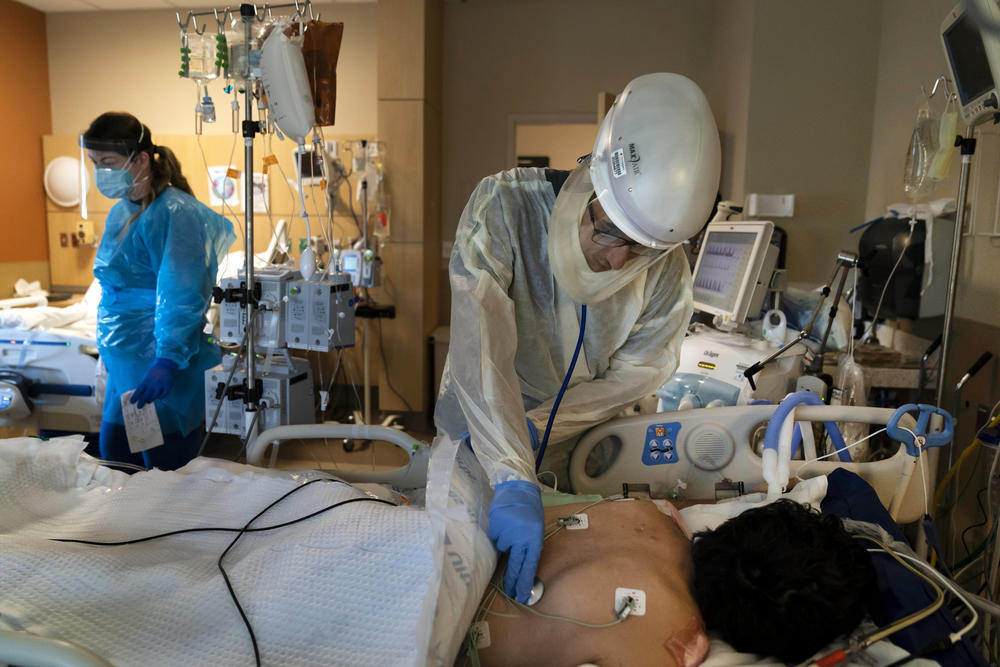
Section Branding
Header Content
Doctor: COVID-19 Is 'Out Of Control' Again In Georgia
Primary Content

With COVID-19 surging around the state, a doctor within Georgia’s largest health system said the novel coronavirus is so “out of control” that sick Georgians are overwhelming hospitals at a never-before-seen rate in the pandemic.
“This is the most rapid increase in number of cases that we've had among any of our surges so far during the pandemic,” said Dr. Danny Branstetter, the medical director for infectious disease and infection prevention at WellStar Health System.
The surge in sick patients, he said, has strained resources on an already overstressed medical staff. He said he believes hospitals have enough personal protective equipment to treat those who are ill, but "my most critical concern about another surge is personnel."
"Just the amount of emotional and physical toll it has paid on our health care providers to date," he said. "It is visible. I think we see that in the number of people who are leaving the profession or may be suffering burnout."
At WellStar’s Kennestone Hospital in Marietta, the facility this weekend implemented a “no visitor” policy due to the large number of COVID-19cases there.
WellStar is Georgia’s largest health system with 11 inpatient hospitals, stretching from metro Atlanta to LaGrange. It also operates more than 200 medical offices around the state.
The surge isn’t confined to WellStar. According to state data, more than 70 hospitals are listed as overcrowded with COVID-19 patients.
“Things continue to deteriorate,” wrote Dr. Amber Schmidtke, one of the state’s best COVID-19 data crunchers, in her most recent newsletter. “There are no signs this is slowing down.”
Spurred by the highly contagious delta variant, the state saw more than 40,000 positive coronavirus cases in a week for the first time since the January surge, Schmidtke said. Overall cases rose by 29%, admissions to intensive care units were up 47% and deaths spiked 34%, according to Schmidtke.
“The state’s case rate has risen 1,390% since July 1,” she said. “It is rising fastest outside of the Atlanta metro [area].”
She added that the state was “close to reaching the record for adult ventilator use.”
The rise in cases has prompted the office of Gov. Brian Kemp to announce he will hold a news conference Monday afternoon — his first major press event to address the pandemic since March, when he announced he was opening up vaccination efforts to a wider population.
The current surge also comes at a time when schools are returning to in-person learning. At least four school districts decided to temporarily shut down after widespread infections were reported.
The vast majority of cases around the state continue to be among the unvaccinated.
At WellStar, Branstetter said the low vaccination rates and the opening of schools was offering a "perfect storm" for wider infection.
"This is the thing that's very frustrating, but also it saddens me so much is because it is preventable," he said. "When I see young people returning from their vacation and having diagnosis of COVID-19 and being hospitalized or have families affected and now the parents in the ICU probably are not going to make it, leaving young children behind — those things really, really weigh heavy on my heart."
He added that they were seeing more and more younger people being admitted "requiring even ICU-level stay."
Branstetter said more than 92% of its new patients are unvaccinated and 7% are listed as "breakthrough cases," fully vaccinated people who still caught COVID-19. He said that shouldn't be an excuse not to get vaccinated because the vaccine has shown its worth, even among those hospitalized.
“There is a benefit and we're seeing reduced length of stays, reduced need for ICU, even going into the hospital post-vaccine in all age groups and all comorbidities,” Branstetter said.
He said the vaccines are nearing full approval by the Food and Drug Administration, and booster shots could be available in the fall to further protect the immunity of those who have already received their shots.
Experts are also monitoring new variants of COVID-19, such as hospitalizations for what is being called the “delta-plus” variant in Florida.
“It's of interest,” said Branstetter. “It doesn't seem to be as concerning as maybe the delta [variant] at this current time, but certainly one to be watching.”
At the current rate of infection, Branstetter foresees a return to remote learning for many schools and more people continuing to work from home.
But he said he fears that if more people don't get vaccinated and people keep gathering in large crowds without wearing masks, things could get worse in coming months.
"Adding to that fuel to that perfect storm," he said, "we could be set up for a significant spike in COVID-19 this fall."
According to the Centers for Disease Control and Prevention, more than 1.2 million COVID-19 cases in the state have been reported since the start of the pandemic, including nearly 22,000 Georgians who have died from the disease.


